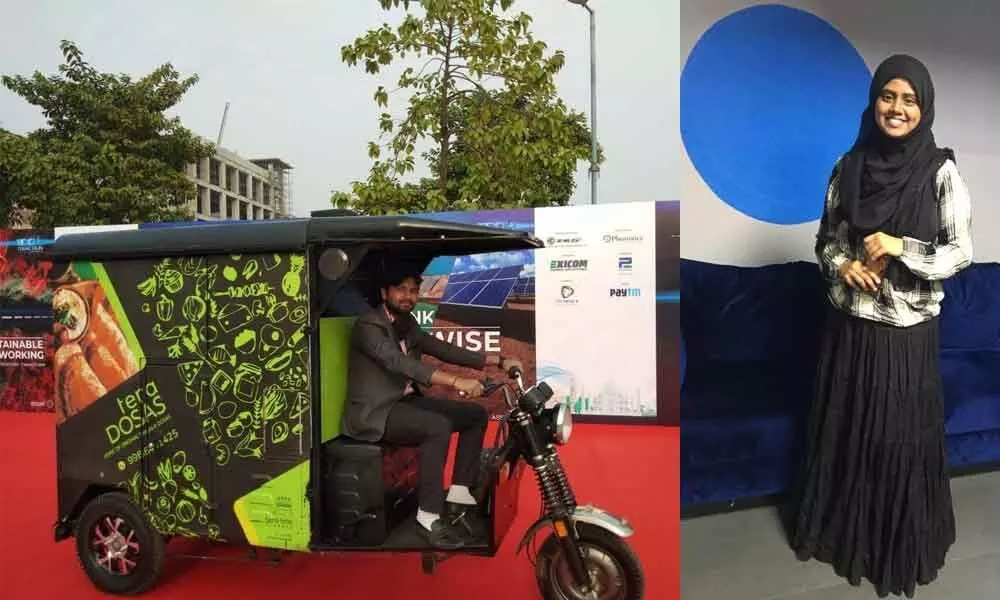Taking street vending to next level

Smart carts are necessary to ensure a sustainable way of street vending. Street food commerce is highly influencing more than 40M families and the technology and organised way of food vendoring certainly help them empower themselves to the next level and the end user to prefer hygienic street vending,” says Bunisha
Bunisha Khaja Mohaideen, Co-Founder of Terabite E-karts, a food application driven e-vehicle company formed to empower streetpreneurs
Terabite E-karts is a blend of sustainability and eco-friendly e-vehicles. It was launched in 2020 with an initiative driven by the need of today's environmental and health concerns.
These technology-powered, electric built street food carts are set to bring a revolution to the concept of unorganized and unhygienic street vending, to race towards a zero-emission society by maximizing adoption of the electric vehicles through the application-driven smart electric vehicle.
They aim at empowering rural, women, veteran street vendors who are at the bottom of the social pyramid by offering e-Food karts with technology and solutions who become streetpreneur not just street vendors.
Bunisha shares, "It was in 2020 that I felt the need to address the present environmental and health concerns. I always pondered upon one question; when was the last time you saw a street food vendor maintaining hygiene while offering food? I believe that the affordability of taste is undeniably tempting.
However, it should never be at the cost of one's health. I believe that our concept is fresh, one of its kind, very essential, and was inspired to convert the idea into reality.
The electric cart variant, Tera Dosa will have a payload capacity of 400 kg plus the driver and a top speed restricted to 22-25 km/h. The company claims to deliver a range of about 70-80 km on one full charge (ARAI approved). The cart will come with advanced telematics, smartphone connectivity."
Like other EV players, convincing people to adapt to EV is always challenging and people are yet to foresee the transformation because of lack of proper infrastructure like charging stations. However, affordability helps to drive through this challenge and that's our prime focus.
She adds, "We need to put extra effort to create awareness and offer post service support to create more credibility and win the minds of street vendors. The affordable smart carts are necessary to ensure a sustainable way of street vending.
Street food commerce is highly influencing more than 40 Million families and the technology and organised way of food vendoring certainly helps them to empower themselves to the next level and the end user to prefer hygienic street vending.
Electric vehicles adaption in India should reach the lower bottom of the pyramid for real transformation towards zero emission. Electric Vehicle powered street food carts with end-to-end solutions could be a major attraction and encourage street vendors to shift to EV."
Sharing about the scope of electric vehicles in India, Bunisha shares that EV's scope in India is highly promising. Governments initiatives, Subsidies and policies will help EV players and people to transform into a zero-emission way of transportation.
Electric vehicles have evolved in the last decade in India. With fast charging technology to better speed offering by electric vehicles, they have certainly brought in a good amount of change in the automotive industry.
The customers are also more receptive towards the concept of electric vehicles that makes the adoption easier in the years to come. Mobility in India will witness a drastic change in the years to come to cater to a large population. The best option to support such a large population is electric as there is an increased need to shift to a green future and reduce dependence on imported crude oil.
"Like many other startups, this pandemic stalled the company's progress too and they were lagging behind as per the initial forecast. But this certainly helped in understanding the market deeper and the lives of street vendors. In fact, it helped Terabite to come up with an improved version of what they initially thought in the most affordable way," concludes Bunisha.

















